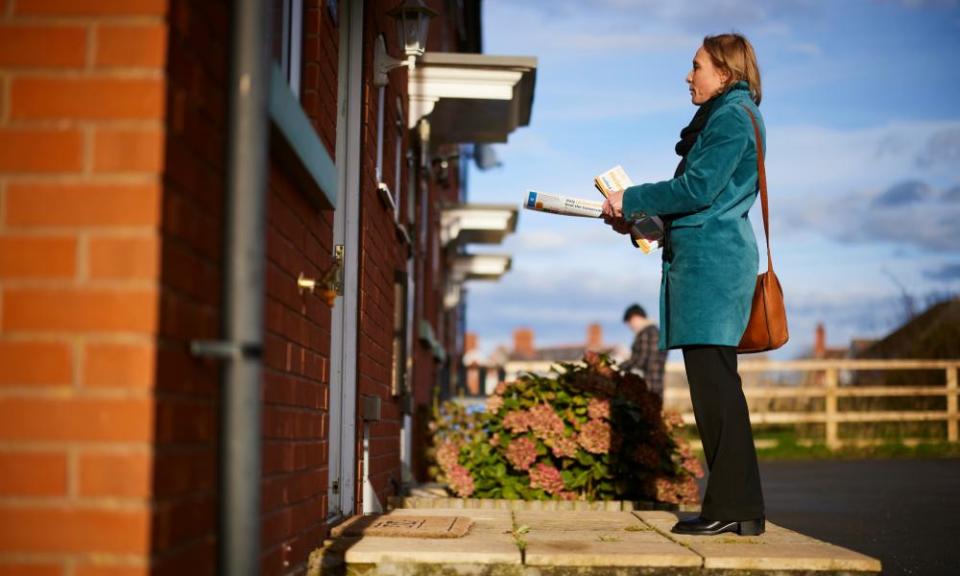Johnson faces trust crisis as sleaze shatters faith in MPs
Poll reveals huge public cynicism, with just 5% of respondents believing politicians work for public good
Trust in politicians to act in the national interest rather than for themselves has fallen dramatically since Boris Johnson became prime minister, according to figures contained in a disturbing new study into the state of British democracy.
The polling data from YouGov for the Institute of Public Policy Research (IPPR) shows a particularly sharp fall in trust in the few weeks since the Owen Paterson scandal triggered a rash of Tory sleaze scandals.
Related: Why trust politicians? How UK voters lost faith in our leaders
In 2014, when David Cameron was prime minister, 48% of voters believed politicians were “out merely for themselves” as opposed to their country or party. This had increased to 57% by May 2021 after nearly two years of Johnson in No 10, and leapt to 63% last week in the wake of the Paterson affair. In the same poll, just 5% of voters thought politicians were in the job primarily for the good of their country.
While the polls have asked about politicians of all colours, the main opposition parties now believe the Tories are particularly vulnerable on questions of trust and sleaze, offering them a chance to break through.
Last week, after he reshuffled his frontbench team, Keir Starmer wrote to all shadow cabinet ministers stressing the importance of ethics as one of many qualities they had to demonstrate, day in, day out. He also stressed the need to hold the Tory government to account for its constant “slogans” and “broken promises”.
The poll findings come amid reports from the Liberal Democrats that they have dramatically closed the Tory lead in the previously safe seat of North Shropshire, where a byelection will take place next week following the resignation of Paterson, who was found to have broken parliamentary lobbying rules.
According to internal polling based on postal votes, party insiders say the Lib Dem vote has risen from 32% to 38% in the past fortnight, while the Tory vote has fallen from 52% to 44%. If accurate, this would mean the Conservatives’ lead has fallen into single digits. At the last election, the Tories claimed 63% of the vote.
With the Lib Dems hammering away on the theme of sleaze in the byelection, Johnson visited the seat on Friday in an attempt to lessen Tory jitters and boost his party’s campaign.

A Liberal Democrat source said the seat would be even harder to win than Chesham and Amersham had proved to be in June, where Ed Davey’s party scored a shock victory.
However, the source insisted the Lib Dems had momentum behind them. “Conservative support is draining before our eyes – our data shows they have lost at the very least 15% of their share of the vote,” they said. “This is definitely looking like it will be a close contest, and the Conservatives are in panic mode.”
Robert Ford, professor of politics at Manchester University, said if the Lib Dems were to take the seat, where they had been strong before entering into coalition with the Conservatives in 2010, it could be a huge moment, not only for them but for British politics. “It would show not only that the slate had been wiped clean from the coalition but also that the political damage of being ultra-Remain had also gone. It would be really, really good news for them and really, really bad news for the Tories.”
On Saturday, there was more unwelcome news for Johnson as police said they were considering complaints from Labour MPs that the prime minister and his No 10 staff held Christmas parties in breach of Covid regulations a year ago. Labour backbenchers Neil Coyle and Barry Gardiner have written to Scotland Yard asking police to investigate reports that two parties were held in the run-up to last Christmas at a time when such gatherings were banned.
Johnson has not denied the events took place but said no rules were broken – although he has repeatedly refused to explain how that could be the case. In a statement, the Metropolitan police said that while they did not routinely investigate “retrospective” breaches of Covid regulations, they were considering the correspondence they had received.
In an interview for today’s Observer, the new shadow secretary of state for levelling up, Lisa Nandy, said Starmer had been clear after the reshuffle that he now had the team that could take on the Tories and deliver for the country once in power.
Nandy said news that the government had delayed a white paper on levelling up because of disagreements over strategy and the definition of the term showed they had never been serious about plans to make the UK more equal in the first place.
She added: “They are in complete disarray on what is supposed to be the key element of their national policy at the next election. They have nothing to put in the white paper and I hear they can’t even agree what levelling up actually means. It is my job to expose their slogans and empty promises every day until the election.”
The IPPR report – the first in a series that will look at the causes of distrust and possible remedies to shore up UK democracy – concludes that declining trust is a serious danger to the efficient functioning of society.
“It matters for our democracy: where an absence of trust turns into active distrust – characterised by cynicism and disillusionment – it can lead to a downward spiral of democratic decline,” it says.

 Yahoo News
Yahoo News 
